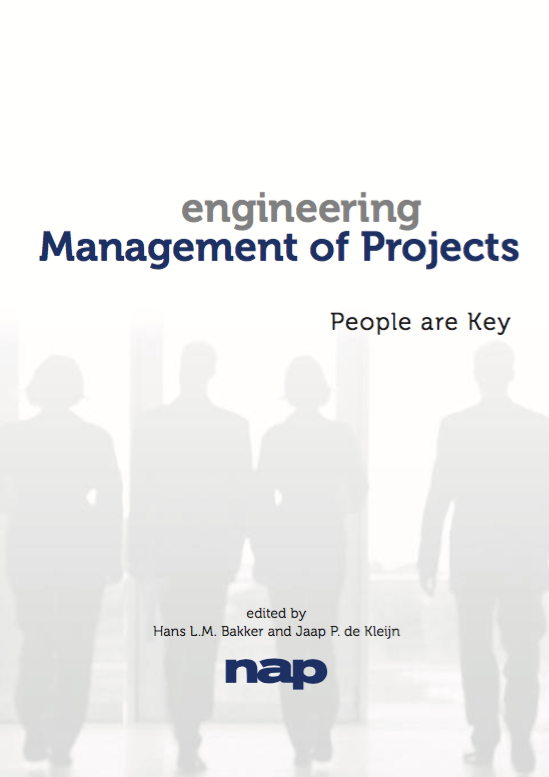Course Syllabus
Project Management of Engineering Projects: Preparing for Success!
Click the button to print the course syllabus.
Index
1. Introduction
1.1. Learning objectives
1.2. Course activities and resources
1.3. What we expect from you
1.4. What you can expect from us/the course team
2. Course structure & Release dates
3. Assessment
4. Resources & Tools
5. Certificate
1. Introduction
Are you a (project) engineer with a technical background but lack management knowledge? Are you eager to improve project performance and want to expand your knowledge?
The early phases of a project, the so called front end development phases, are crucial for its business and management success. During this course we will focus on the necessary project management skills to successfully manage projects, distinguishing three areas:
- The project manager and the team
- The project process
- The project context
You will create your own project execution plan, either in a team effort or
The course is build on the book "Management of engineering projects - people are key" edited by Hans L.M. Bakker and Jaap P. de Klein. The book can be bought at VSSD on TU Delft Campus.
1.1. Learning objectives
By the end of this course, you:
- Are aware of the importance of the front-end phases to create a successful project
- Are able to select an appropriate project manager and project team
- Are able to reflect whether becoming a project manager could be a career path for you
- Have improved your skills working together in a specialized project team
- Are able to write a brief project execution plan for a simple engineering project
1.2. Course activities and resources
This DelftX based course has 7 content modules and a start-up module (week 0) with an estimated workload of 4 to 6 hours per week. Week 0 is just meant to get to know each other and to set the scene.
The course is
- Introduction and learning objectives. Every module starts with a brief overview of the content you can expect and what deadlines you will face in that week.
- Video modules. Each module consists of 2 to 3 videos: at least one video lecture per week introduces the main content for that week and at least one video per week illustrates experiences from practice. Additionally, we will provide a feedback video at the end of every week, based on the discussions you had in the discussion forum and in the team tool.
- Assignments. After the video, often a small assignment is given in order to bridge the gap between theory and practice. Most often you are asked to first think about the answer individually, and next you need to discuss it
in your team to come to a joint team conclusion, using the team tool. - Team tool. In module 2, we will facilitate the creation of small teams (up to 10 fellow course mates), using the Team tool. This tool can be used for team discussions and to jointly draft the project execution plan (PEP) with your team. The PEP is to be submitted at the end of the course for peer review. You are expected to give feedback to your peers and receive feedback from them. From our point of view, a MOOC on project management needs to include group-work, since you will hardly ever perform a project on your own in real life!
- Quizzes. Every module has a graded quiz at the end. From these 7 quizzes, 6 will count for 50% of your final grade for this MOOC.
- Book. The corresponding reading materials for a specific module can be found under "textbook". Additional reading is available under the tab "additional reading".
1.3. Group activities
As stated before, from our point of view, a course in project management asks for a team approach. The minor project groups consisting of 6 people will be used from module 2 onwards. You will jointly work on all ingredients of the project execution plan that is to be delivered as a group assignment at the end of the course.
Experience shows that groups can work efficiently for example in a google docs environment. After completion of a task, the assignment can be uploaded to the Delft
A tip from us: don't wait for all other group members to confirm or complete tasks. If you are done with a task, start working on the next one. In this way, you are less dependent on others.
1.4. What we expect from you
As an online student, we expect you to be an active participant, contributing to a positive atmosphere by questioning, sharing and helping out others using the Team tool and the general discussion forum.
Regarding deadlines, we recommend staying on track in order to benefit from learning within the community. In your group work, if you face an obstacle in a specific week, inform your team.
This course is meant to be a place where you learn with and from others. In this sense, we'd like you to experience collaboration and peer-feedback, so please make sure you cooperate with other participants in order to enrich the overall learning experience.
When communicating with your fellow learners and course team using the Team tool or general discussion forum, please make sure you take into account the Discussion forum guidelines and Collaboration guidelines.
1.5. What you can expect from us/the course team
The course team will release the weekly content, send important announcements, monitor and answer questions on a regular basis. We'll try to have a daily presence at the forum, but as you might understand we cannot promise to quickly answer everyone, due to the many learners participating in this course. But we'll do our best ;-)! On Thursdays just before the start of the next module, we will post a feedback video reflecting upon the discussions in the Team tool and the discussion forum.
2. Course structure & Release Dates
Module 0. Welcome and course overview (September 2, 2021)
We’ll give an outlook of the course and explain the course structure. The course uses a challenging mix of knowledge clips, video’s, quizzes, and assignments integrating your own experiences from practice with attractive examples from industry and new insights from theory.
Module 1. The need for and the importance of project management (September 2, 2021)
This module highlights the need for this course by showing examples of failed projects as well as successful projects. How is project success defined? How is it achieved? We explain the choice of focusing this course on the front-end phase of projects and the people aspect of projects.
Module 2. Organising the team (September 9, 2021)
This module focuses on the team effort that is needed to bring a project to a successful end. It shows why teamwork is essential and why it should not be taken for granted. It explains which challenges the project manager faces in developing a group of specialists into a coherent team. You will obtain insight in your own
Module 3. Opportunity framing (September 16, 2021)
Now that you formed the teams the real experience can start. In this module all necessary steps of the early project phases are elaborated: identifying the stakeholders involved, scoping of the project (high level) after formulating the project objectives and setting up the initial risk register. With your team, you will experience the above steps, resulting in the selection of a topic for your team’s project execution plan.
Module 4. Assuring value (September 23, 2021)
This module we will elaborate on the management processes to be followed in a project. How do we create value? And how to assure it? What activities have to be performed? For which types of projects? And to conclude: what are the ingredients of a project execution plan?
Module 5. Selecting the contracting strategy (September 30, 2021)
In selecting the appropriate contracting strategy, we should not only focus on the contract. This sounds contradictory, but it is an essential lesson to learn in this module. We will introduce the contracting quilt and explain the importance of relational attitudes.
Module 6. Time and cost estimates (October 7, 2021)
Now a lot of the project preparation is done, it is time for some basic project management skills: the skills of scheduling and cost estimation. After
Module 7. Bringing it together in the project execution plan (October 14, 2021)
And finally: all
Summary overview of deadlines
| Module | 0 | 1 | 2 | 3 | 4 | 5 | 6 | 7 | |
| Release date | 02-sep | 02-sep | 9-sep | 16-sep | 23-sep | 30-sep | 07-okt | 14-okt | |
| Assessment | |||||||||
| Individual (50%) | Quiz 1 | Quiz 2 | Quiz 3 | Quiz 4 | Quiz 5 | Quiz 6 | Quiz 7 | ||
| Deadline quizzes 21-okt | |||||||||
| Group work (50%) | Opportunity Statement | Structure of plan | Contract | Costing Scheduling | PEP | Peer Review | |||
| Submission deadlines groupwork | 23-sep | 30-sep | 07-okt | 14-okt | 21-okt | 28-okt |
3. Assessment
To complete this course you have to score at least 60 points of the total mark of 100. The different components count towards the total mark as:
- Individual Quizzes - 50%. At the end of every module, there is a quiz to test your knowledge. From the 7 quizzes, the lowest score will be dropped.
- Group Assignment* - 50%. Only the group assignment that you hand in at the end of the course will be graded and counts for the course.
4. Resources & Tools
All educational resources for your learning experience will be available in the course. They consist of short video lectures, interviews with practitioners, transcripts, small individual assignments to practice the concepts introduced, assessed quizzes and group work. We will stimulate lively interactions with your fellow course members by actively using the Team tool of the
There is a general discussion forum in the course for all students of MEP101x. This discussion forum is subdivided into many forums. You may use these forums to discuss course concepts, problem-solving approaches, interesting references, or other topics related to the course. You may just use it to ask questions. The forum is moderated by the course staff. While collaboration is welcomed and encouraged, you are not allowed to post full solutions. Please observe the appropriate online etiquette as outlined in the Forum Guidelines.
Every module contains a discussion assignment, and from Module 2 onward you will discuss in your teams using the team tool. The discussion assignments provide insight into the translation from theory to practice. At the end of each module feedback on the team discussions and the forum discussions will be given by one of the professors in a short feedback movie.
 |
The reading material in this course is based on the book "Management of Engineering Projects - People are Key" by Bakker and de Kleijn. The book can be ordered from VSSD on TUD Campus |
***
LICENSE
The course materials of this course are Copyright Delft University of Technology and are licensed under a Creative Commons Attribution-NonCommercial-ShareAlike 4.0 License.
If you choose to reuse or repost DelftX course materials you must give proper attribution. Please utilize the following citation and refer to this MOOC:
"[TITLE OF WORK –with hyperlink to material] by TU Delft / [LECTURER NAME -with hyperlink to lecturers page] is licensed under CC-BY-NC-SA 4.0. This material was created by or adapted from material posted on the MOOC Project Management of Engineering Projects.”
***
Click the button to print the course syllabus.

